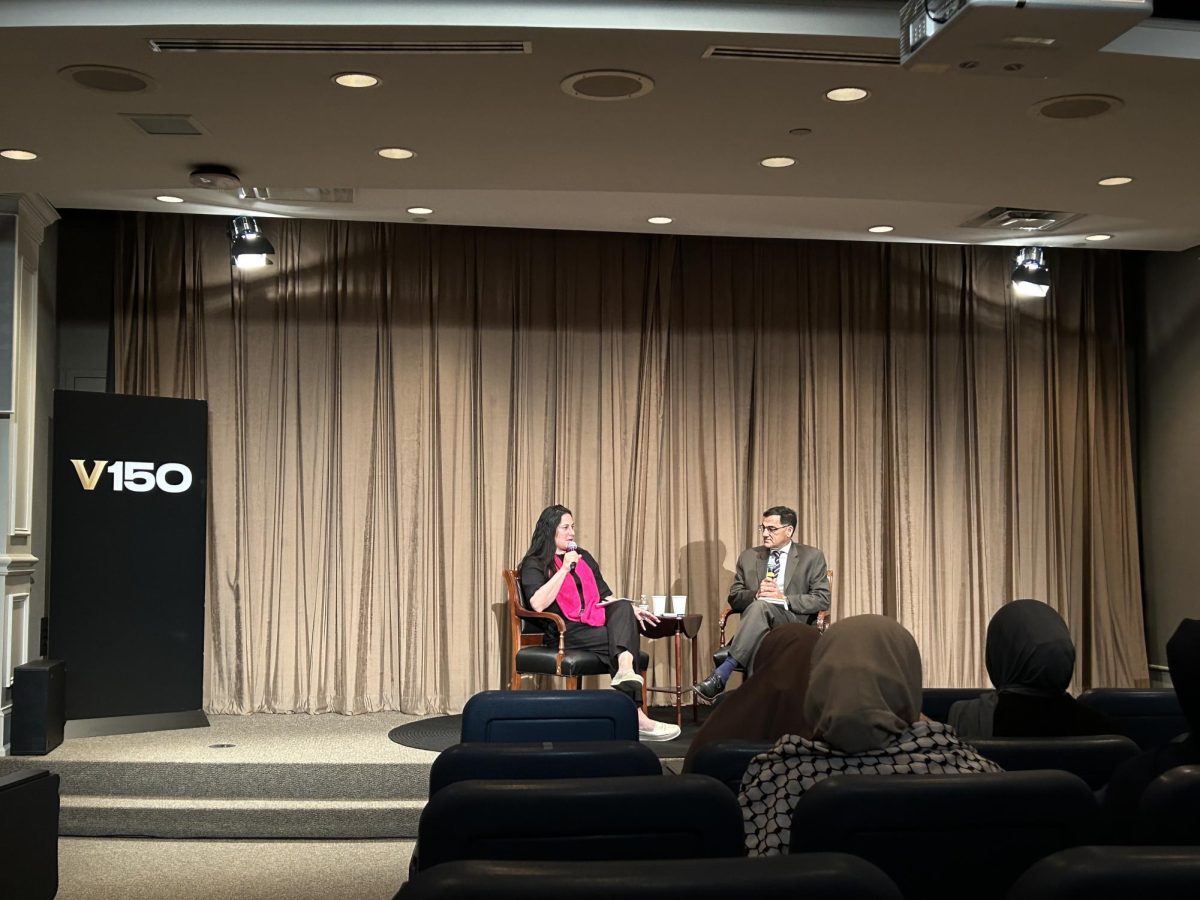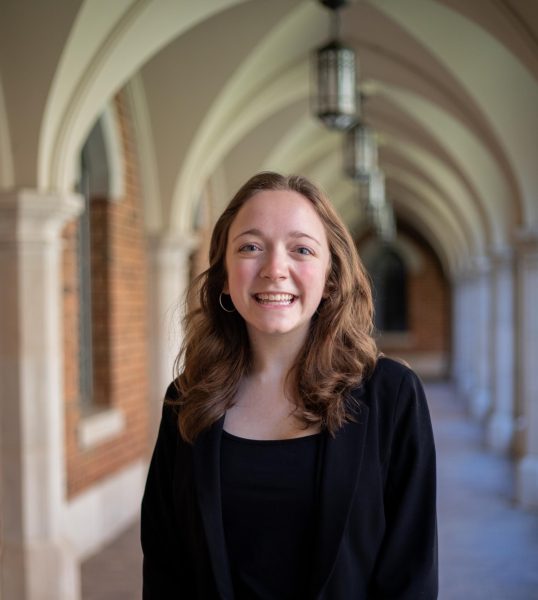The Vanderbilt Project on Unity and American Democracy hosted Salam Al-Marayati, the president of the Muslim Public Affairs Council, on April 22 for a conversation about student protests on college campuses and the ongoing Israel-Hamas war. This discussion was moderated by Professor of Political Science and Law Samar Ali and followed by an audience Q&A session.
MPAC is an advocacy and public policy organization working to improve the perceptions of Muslims in the United States. Al-Marayati is an adjunct faculty member at Bayan Islamic Graduate School and board member of the Muslim Reform Institute. He has spoken at the White House, Capitol Hill and as a representative of the U.S. at various international conferences. He also previously served as the co-chair of the Interfaith Coalition to Heal Los Angeles.
Junior Areeba Alam and other leaders of Vanderbilt’s Muslim Students Association helped to organize the event. Given past controversy surrounding perceived biases in the Dialogue Vanderbilt speaker lineup, Alam said MSA’s goal in organizing this event was to bring a pro-Palestinian voice to campus. Al-Marayati is the third expressly pro-Palestinian speaker brought to campus since Oct. 7; the previous two were Maha Elgenaidi as part of the Unity Project’s Interfaith Dialogue Series and former Palestinian prime minister Salam Fayyad as a guest of Associate Professor of Political Science Brett Benson’s class “Introduction to International Politics” and conversations with Dialogue Vanderbilt fellows.
“We initially reached out to admin, specifically to those leading some of the programs involved in the Dialogue Vanderbilt initiative, due to the unfortunately biased and one-sided pro-Israel speakers the university had hosted thus far and talked through our concerns on how the university has been implementing its principle of neutrality in regards to the ongoing genocide in Gaza and related student protests on campus,” Alam said.
Alam expressed excitement about Al-Marayati’s pro-Palestine stance and said she was “pleased” with the outcome of the event.
“We hope that we can hold more events like this next year and hope that these will help bring awareness to the fight for Palestinian liberation and bring to light the perspectives of Muslim and Arab students on campus,” Alam said.
Pro-Palestine protests on college campuses
Al-Marayati discussed his recent opinion piece in the LA Times condemning USC’s cancellation of Asna Tabassum’s valedictorian speech. He said his aim in writing the article was to convey that universities should “cherish our students” and “not exclude them” despite the popularity of the American narrative characterizing Islam as a threat to national security.
“To this day, discourse — media discourse, government discourse — is still suppressed,” Al-Marayati said. “Anybody that comes forward and has [a dissenting] opinion is going to be targeted, is going to be criminalized, is going to be isolated and punished. And that is what we’re trying to change.”
Al-Marayati criticized the stance the U.S. has taken in supporting the actions of the Israeli government, citing their veto of a resolution that would have recognized Palestinian statehood.
“We’re trying to help out — then they’re sending weapons to kill more Palestinians, and they’re vetoing resolutions that would hold people accountable,” Al-Marayati said. “We [the U.S.] believe in human rights except when it comes to this issue.”
When answering a question about his experience growing up as a college student in the 1980s during the anti-apartheid movement, Al-Marayati said the conflict taught him that college campuses are the “perfect place” for discourse around global issues.
“It is designed to be a part of civil society. That will be that buffer that is actually part of the checks and balances against what status quo government policy is,” Al-Marayati said.
Responding to the ongoing encampment protest in front of Kirkland Hall, Al-Marayati said he appreciated that the first thing he saw when arriving on campus was a protest, calling the concept an “American tradition.” He also encouraged the Vanderbilt administration to lobby the Tennessee state legislature to decriminalize the Boycott, Divestment and Sanctions movement.
“I hope that Vanderbilt can be one of those places where we have that idea of reinvigoration of these ideals. And I believe that American Muslims can be an integral part of that process, because we know what dictatorships are,” Al-Marayati said. “Many of us fled Saddam Hussein and the Ba’ath Party, so we know exactly what tyranny is all about.”
Ali proposed a framework of looking at the Israeli-Palestinian conflict as “people who want peace versus people who want war” instead of Palestinian versus Israeli, to which Al-Marayati agreed.
“[Martin Luther King Jr.] said ‘I don’t want negative peace where I acquiesce to racism and injustice. I want positive peace, which is the peace with justice,’” Al-Marayati said.
Audience Q&A
In response to a student question concerning the university’s stance of principled neutrality and the way administration has disciplined students following the sit-in at Kirkland Hall, Al-Marayati said he sees the university “going down a very slippery slope.” He said he believes principled neutrality “is not neutral” when used to threaten the careers and reputations of students.
“This idea of neutrality — I never bought into it. If they really want to be balanced, if that’s really what they mean, they they would be supporting and protecting students who are on the side of opposing genocide,” Al-Marayati said.
Another student sought advice regarding how the university’s handling of the campus protests might be adversely shaping participating seniors’ perceptions of their Vanderbilt experience. Al-Marayati expressed sympathy with the sentiment, but he encouraged students to continue protesting as “instruments for justice” to give voice to those who may not have one.
“Where there are allies on campuses, universities and in government — including Congress, the State Department or even the National Security Council — or people who are at least willing to listen to what you have to say, it is our responsibility to deliver the message and to build partnerships because we cannot do it alone,” Al-Marayati said.
In concluding the event, Ali shared her experience growing up in Palestine and engaged in a conversation with Al-Marayati concerning faith and religious freedom. Al-Marayati said he believes religion highlights the importance of liberating people.
“[It is important] we start liberating people from racism, from apartheid, slavery and economic exploitation, and that’s our job,” Al-Marayati said. “Let it be a lesson for us to help all people — not just in this issue, but there’s oppression throughout the world. Our job is to fight that oppression.”
Senior Hunter Graves believes the university’s response to protests on campus has influenced pro-Palestine speakers to feel wary about discussing their stance out of fear of retribution.
“I can’t even say that I appreciate it [the event] because it feels like they’re [the university] doing just enough to save face and say that they’re doing something to give a voice to the other side, but it’s not really anything,” Graves said. “It’s the bare minimum, and there’s so much more that the university needs to do to even begin taking the right steps.”




Nacho • Apr 30, 2024 at 3:57 pm CDT
“To this day, discourse — media discourse, government discourse — is still suppressed,” Al-Marayati said. “Anybody that comes forward and has [a dissenting] opinion is going to be targeted, is going to be criminalized, is going to be isolated and punished.”
… says the invited speaker expressing his views at a top university without facing any of the derision, interruption, threats or protests to which those who disagree with his views are regularly subjected.
To be clear, a university is a place for the free exchange and scrutiny of ideas. I’m glad this speaker was invited. I hope that all speakers going forward are afforded the same degree of security and civility.